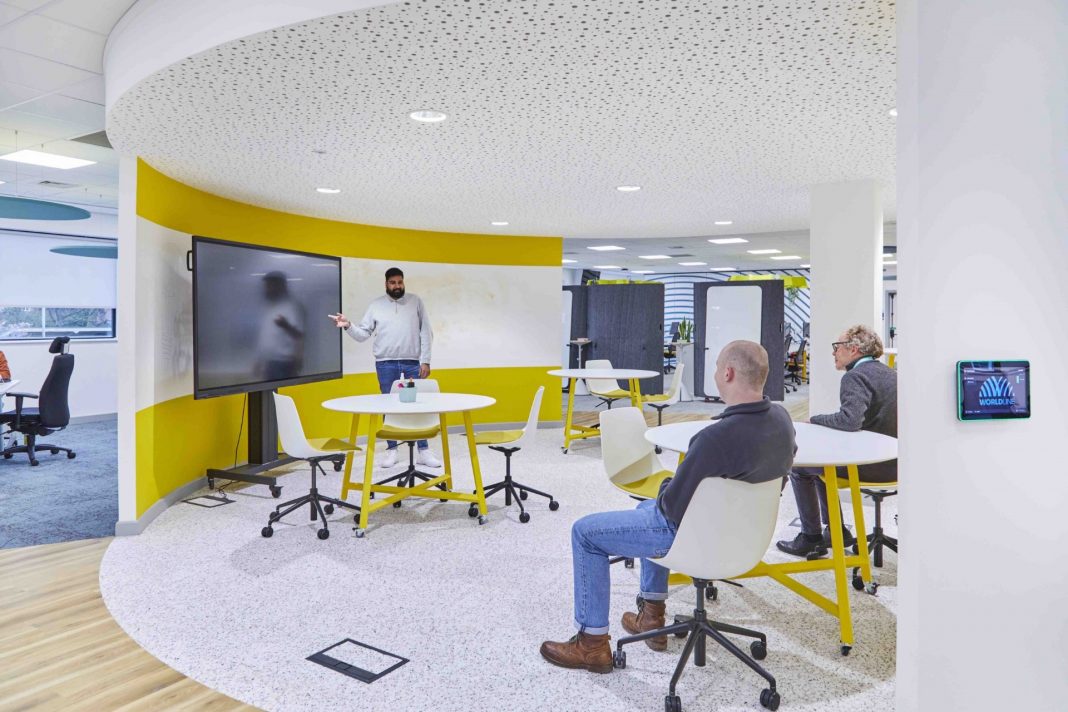Hundreds of business owners from across the Midlands have had their say on the future of the office, in a survey carried out by workplace consultants and office fit-out specialists Blueprint Interiors.
The results were previewed at events hosted at venues recently refurbished by the company and showed that 41% of respondents work 1-3 days per week in the office, while 32% continue to work in the office for the entire week. A noteworthy shift from the conventional 5-day working norm was highlighted, with most people now working 3-4 days in the office.
Companies are now adapting to post-pandemic work patterns, with 76% of businesses making changes for more flexible arrangements.
Meeting the needs of employees who want to come into an office is essential, said the survey with 90% visiting the office to collaborate and 50% for individual work.
Some 82% of people who visit the office said how important good coffee in the office is, indicating the need for communal spaces.
The survey also revealed people value the office for teamwork and collaboration but also to focus on individual work.
Meanwhile, the main reasons for coming into the office include hosting client meetings (54%) and socialising (52%).
The vast majority of respondents, some 93%, think having an office is important for shaping the work culture and achieving business goals, suggesting the physical workspace is still vital for creating the kind of culture you want.
Data showed that 59% want space for hybrid work, 59% want collaborative spaces, 58% want flexible working policies and 46% prefer flexible furniture.
About one-third of Midlands companies implemented all suggested changes to facilitate a return to the office.
Additionally, 38% made some of the requested changes, and 11% have plans for adjustments.
However, 16% of individuals in Midlands companies have shown resistance to returning to the office, while 46% are open to the idea, and 36% fall in between, expressing some level of resistance, as indicated by the survey data.
Instead of urging employees to return to an outdated office tailored to pre-COVID workstyles, crafting a workspace that encourages diversity, autonomy, and flexibility and attributes that align with your workforce’s preferences is essential.
Branding is also crucial, with 90% believing the office design should reflect the company’s brand. However, only 56% feel their current office aligns with their brand.
To create an appealing office, companies should involve their team in the planning process, address individual needs, and foster a sense of belonging.
Chloe Sproston, creative director at Blueprint Interiors, said: “Based on our experience of working through a workplace consultancy process before defining the office design with many people-focused clients such as The Melton Building Society and WorldLine in Beeston, we felt that we already had a thorough enough understanding of employee needs. However, we also knew that these needs varied from company to company.
“This survey set out to create a broader understanding and build knowledge based on wider feedback from the region’s Top 200 employers that we could share with other business owners to help them ensure their workplace strategy is future-proofed. We firmly believe that the process we follow to create environments in which people thrive, enjoy coming to work and are happy and motivated delivers many long-term financial, wellbeing and cultural benefits that outweigh the value of the initial investment.”
Rob Day, CEO of Blueprint Interiors, added: “There’s been a revolution in what people want from their offices in the last few years. The creature comforts of home have become almost too comfortable. So you need to give people a proper reason to embark on what is most likely a gruelling commute – especially when they know that this time could have been used more productively for working, more time with family, or an early morning wellness routine.
“No one’s going to leave the house for a boring, lifeless office that isn’t fit for purpose and doesn’t look after their wellbeing. So the real question is: Is your office worth the commute?
“Once you understand what people want and need from their office, you can make decisions that’ll deliver. In turn, you can design your space to improve the emotional well-being, comfort and social support that your workplace provides. Or in other words, meet your team’s emotional needs.”



